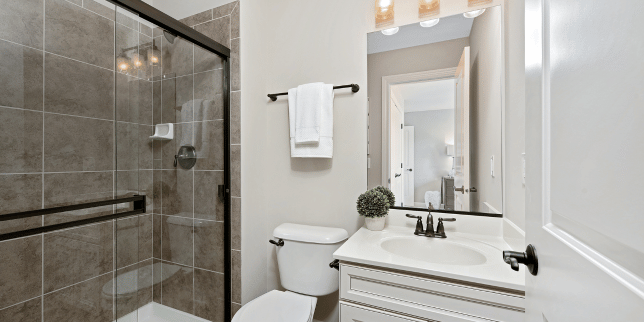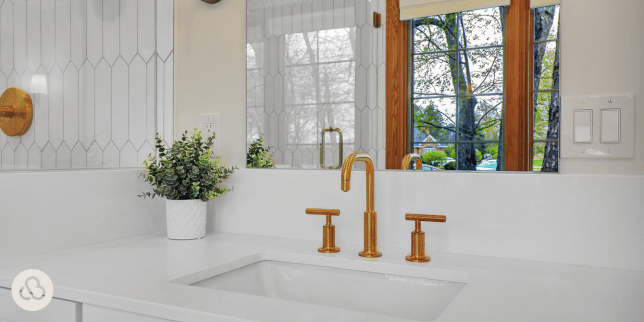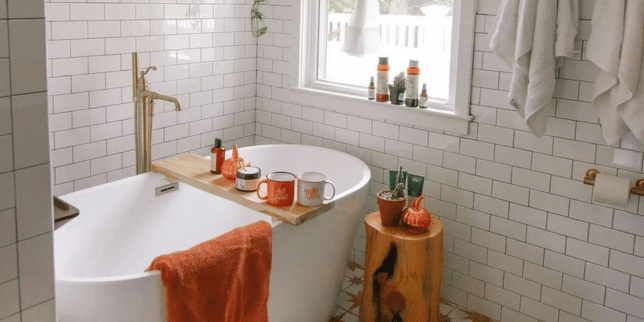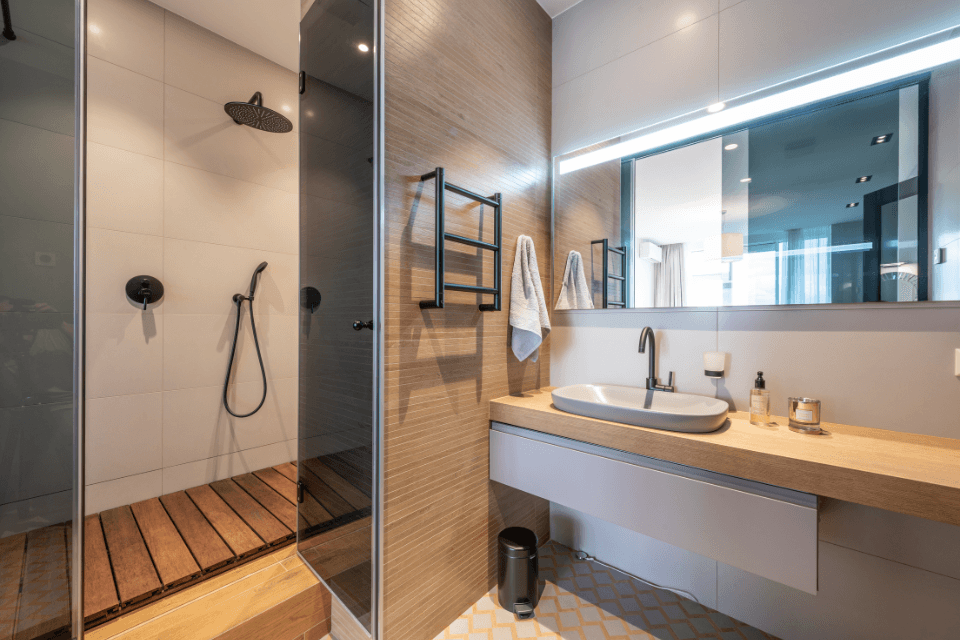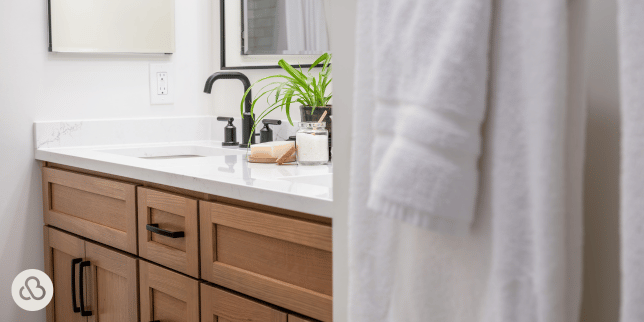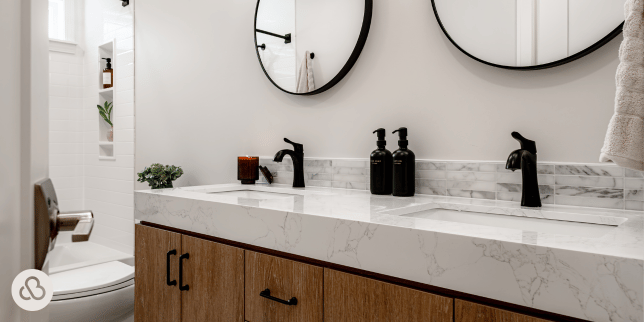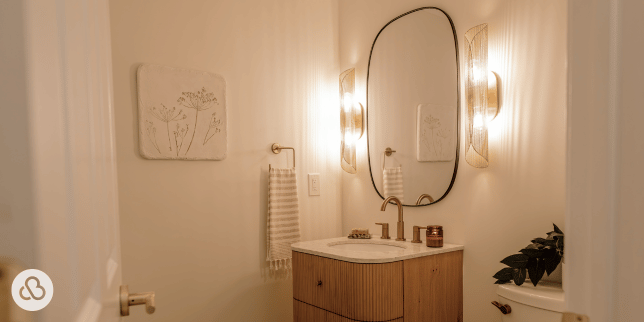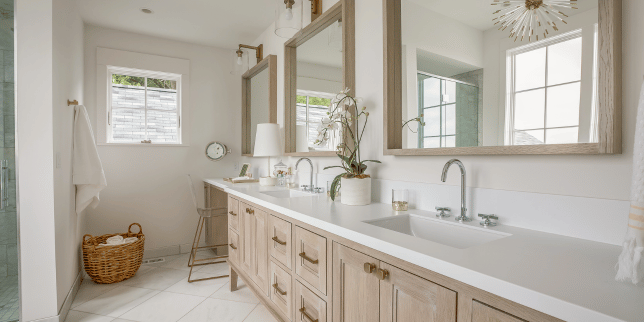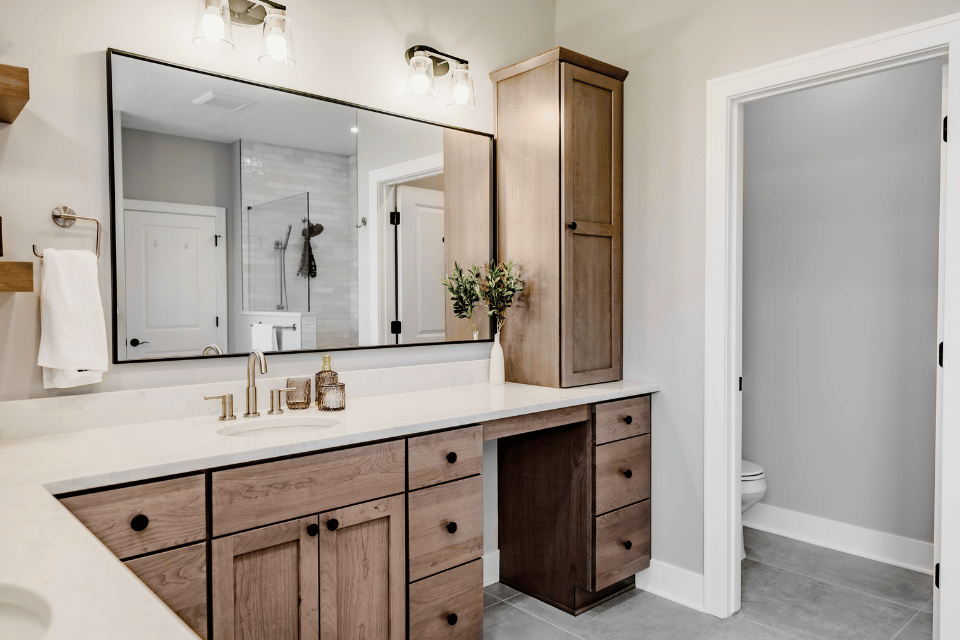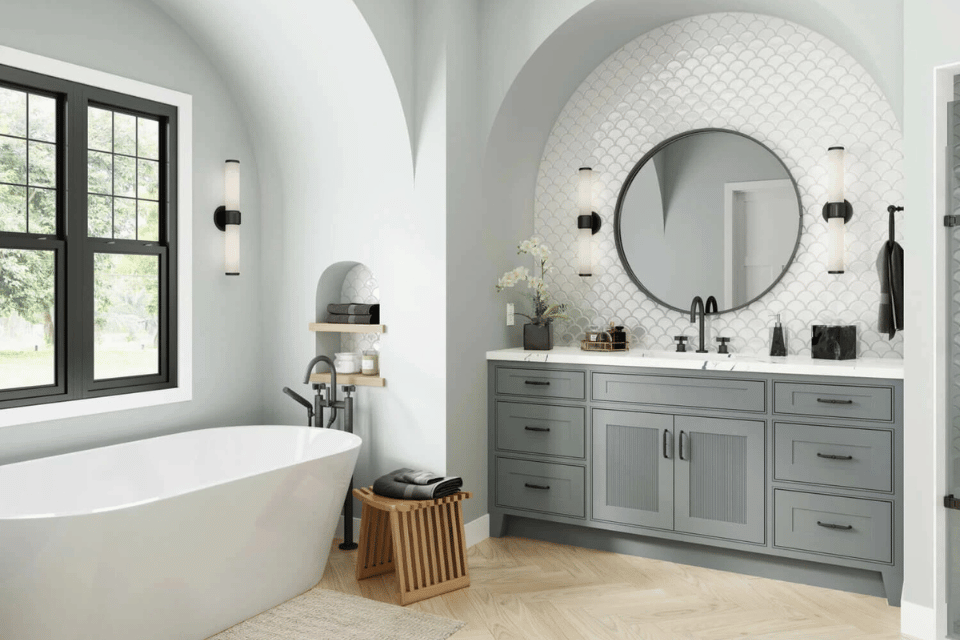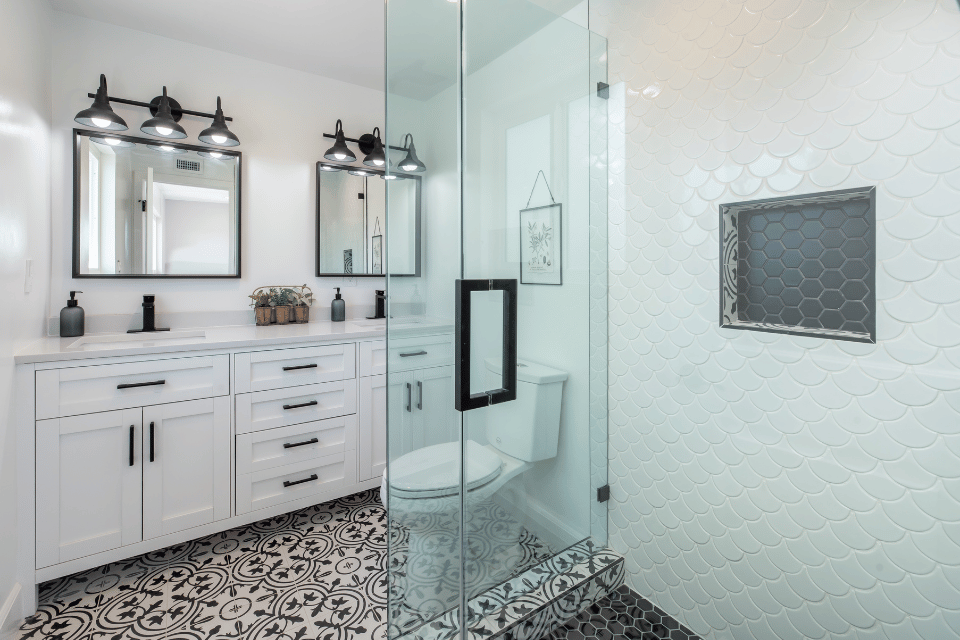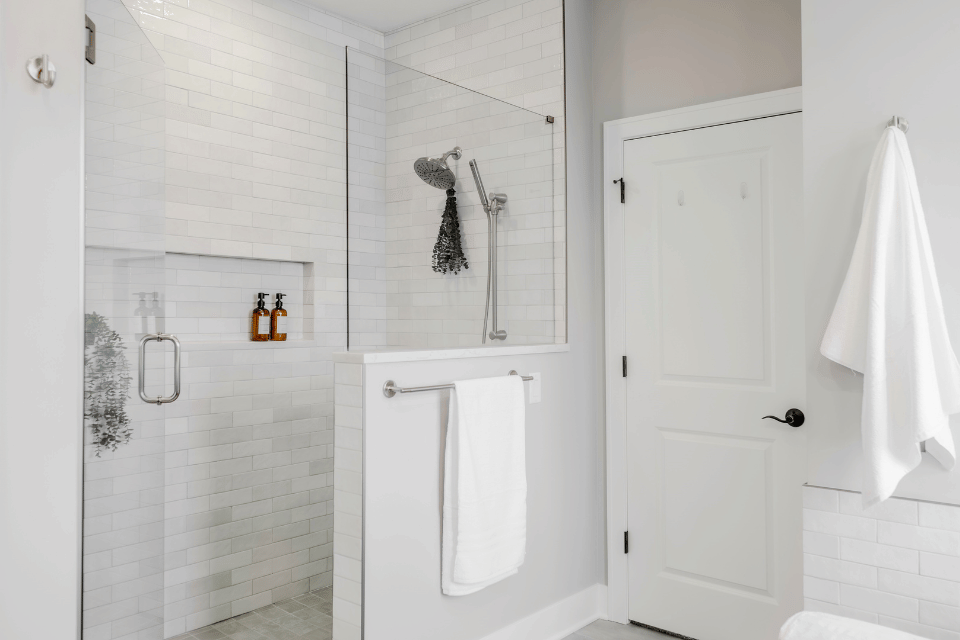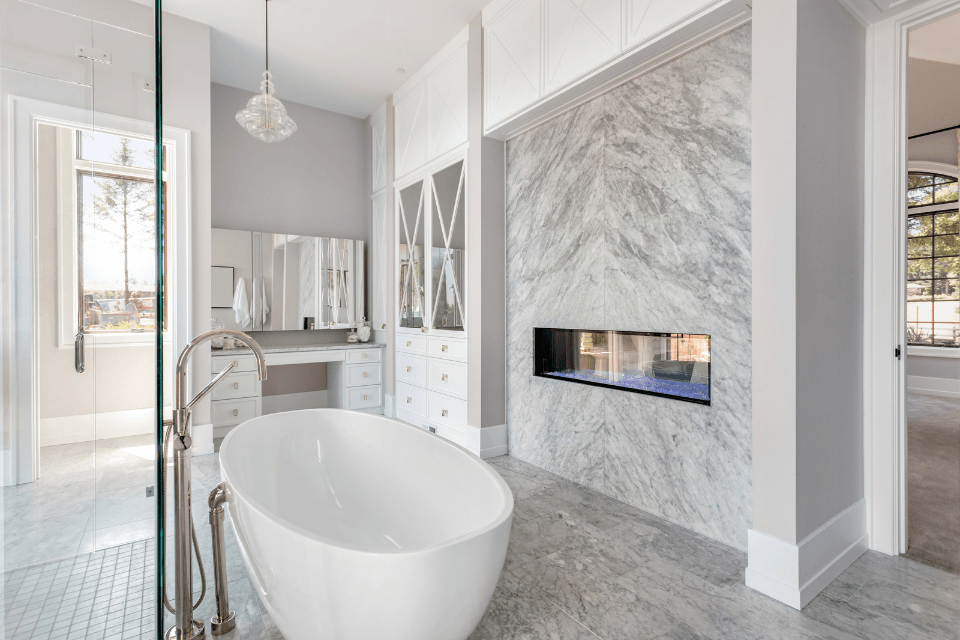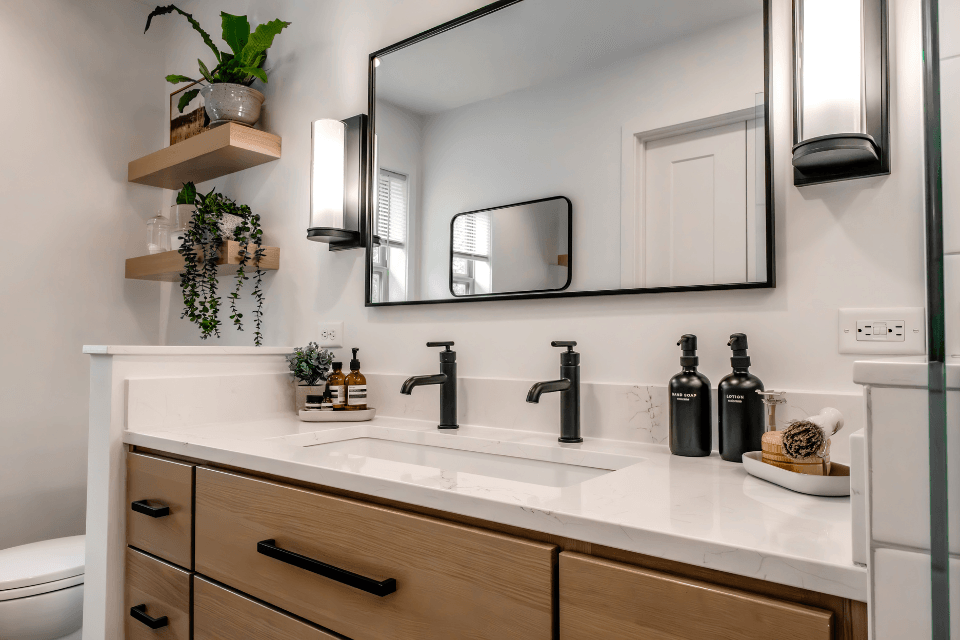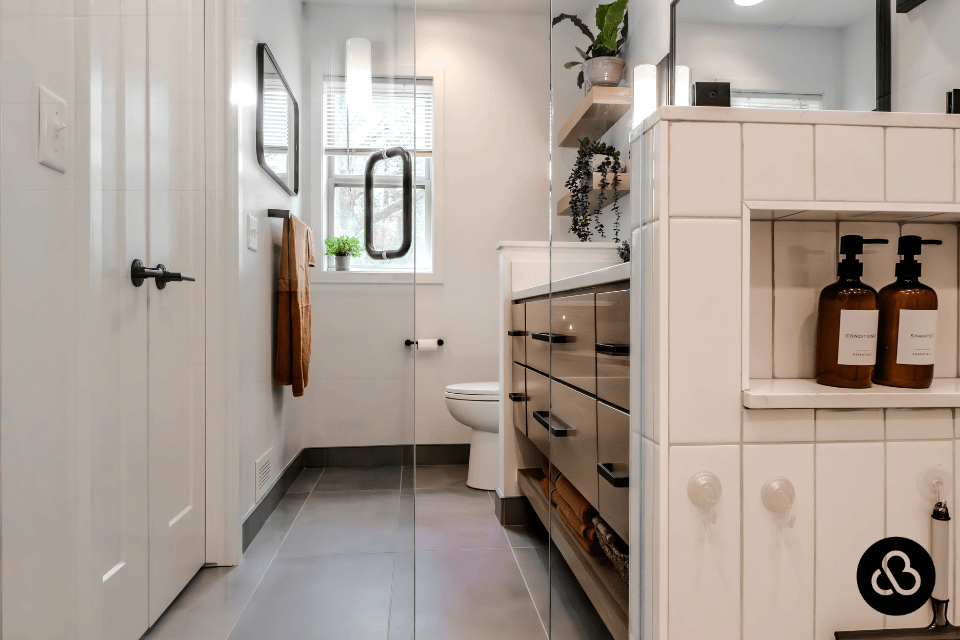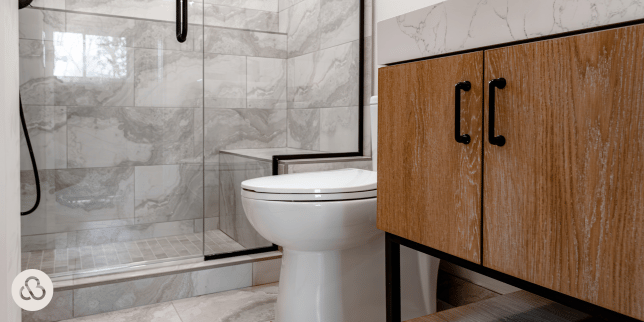
Thinking about remodeling your bathroom but feeling unsure about the finer administrative details? You’re not alone. Many homeowners dive into a bathroom renovation only to encounter an unexpected roadblock: obtaining permits. Skipping this step can lead to fines, failed inspections, or even safety issues that put your family at risk.
At Custom Built, we’ve guided many families through successful, code-compliant remodels in the Greater Lansing and Boyne City area. We know how confusing permit requirements can be, and we’re here to make the process simple, safe, and stress-free for you.
In this article, we’ll walk you through when a permit is (and isn’t) required for your bathroom remodel, so you can make smart decisions, avoid costly mistakes, and move forward with confidence:
- When You Likely Need a Permit for a Bathroom Remodel
- When You Typically Don’t Need a Permit for Your Bathroom Remodel
When You Likely Need a Permit for a Bathroom Remodel
Not all bathroom remodels are equal. Some updates are simple and cosmetic. Others affect the systems that keep your home safe and functional, and that’s when permits become essential.
1. Changing Plumbing Layout
- Moving the tub, toilet, or vanity
- Installing new drain lines or water lines
-
Altering septic connections
These kinds of plumbing changes must be inspected to ensure everything is sized correctly and won’t lead to leaks or backups. If your pipes fail and your remodel wasn’t permitted, your insurance likely won’t cover the damage.
2. Adding or Updating Electrical Work
- New lighting systems or outlets
-
Wiring for heated floors or luxury fixtures (like heated towel bars)
Electrical work needs to be up to code and properly inspected. It’s important to ensure your panel can handle the necessary lines your bathroom needs.
Skipping the permit can put your family at risk of shorts or electrical fires. Even less invasive updates, like adding a light mirror, can overwhelm your system if not installed correctly.
While permits can seem unnecessary for smaller bathroom projects, it is important for the overall safety and value of your home.
3. Installing a New Bathroom in a Basement
Example of a recent basement bathroom installed by Custom Built.
- Cutting into concrete for underground plumbing
- Adding a sewage ejector crock system
-
Proper venting and fall on waste lines
Adding a basement bathroom is a great way to increase a home's value, but only if it’s done correctly. These projects involve significant plumbing and electrical considerations, and skipping the permit could result in septic backups, flooding, or failed inspections during resale.
4. Upgrading HVAC or Ventilation
- Installing or replacing a bathroom fan
-
Making changes to ductwork or roof venting
Even small changes to your vent system can affect the entire HVAC balance in your home. Fans with more powerful motors may require additional makeup air to prevent interference with furnaces or water heaters.
Over the years, we have seen many bathroom fans that are not properly connected and vent straight into the attic space. As time goes on, this type of improper venting will create issues.
5. Homes with Septic Systems or on Upper Floors
- Adding bathrooms to homes with private septic systems
-
Plumbing through multiple floors
While unusual, adding a private septic system will require specific inspections and structural adjustments. If you are considering this, it is important to work with a plumber who will pull permits.
If you are plumbing new lines to a space, like creating a bathroom on the second story of your home, work with a plumber who will pull a permit and ensure all inspections are met!
When You Typically Don’t Need a Permit for Your Bathroom Remodel
Not every bathroom update requires a permit. If you’re not changing plumbing, electrical, or other mechanical systems, you’re likely in the clear.
1. Replacing Fixtures in the Same Location
If you're simply replacing your toilet, sink, or faucet with a newer model without relocating the plumbing lines, you typically don’t need a permit. These updates are considered cosmetic and don’t impact your home’s mechanical systems.
2. Installing New Tile, Paint, Mirrors, or Accessories
Cosmetic changes, such as retiling the shower, repainting walls, or adding new mirrors and towel bars, don’t require permits. These upgrades enhance the appearance and feel of your bathroom without compromising structural or safety elements.
3. Updating Finishes Like Cabinetry or Hardware
You can replace your vanity, medicine cabinet, and drawer pulls without triggering a permit. As long as you’re not adding electrical outlets or relocating plumbing, this type of refresh stays outside of permit territory.
4. Laying New Flooring Without Structural Work Underneath
Swapping out old vinyl, tile, or laminate flooring with a new surface doesn’t require a permit, as long as the subfloor remains intact and no structural repairs are needed. This update is a straightforward way to elevate your space without unnecessary complications.
5. Pull-and-Replace Bathrooms
PC: Lamont Bros.
A pull-and-replace bathroom remodel updates the space without changing its layout, plumbing, or electrical. Because fixtures like the toilet, vanity, and shower stay in the same location, most Michigan municipalities don’t require a permit.
This type of project typically includes swapping cabinets or countertops, installing new flooring or tile, upgrading finishes, and updating lighting without adding new wiring. Since no structural or system changes are involved, it’s a straightforward way to refresh your bathroom, though it’s always wise to double-check local requirements.
Why Permits Matter for Your Bathroom Remodel
Permits are more than just paperwork; they protect your investment, your safety, and your peace of mind.
Skipping required permits can lead to:
1. Stop-Work Orders or Fines
If a building inspector discovers unpermitted work in progress, they can issue a stop-work order, halting your project until you obtain the proper permits. While this is uncommon, we have seen it happen. In this circumstance, you may also be fined, which will lead to unexpected costs and delays to your remodel.
2. Voided Insurance Claims
Homeowners' insurance may not cover damages or injuries resulting from unpermitted work. If something goes wrong, like a plumbing leak or electrical fire, you could be on the hook for all repair costs.
3. Failed Home Inspections
When it comes time to sell your home, unpermitted bathroom work can raise red flags during the inspection process. This can delay your sale, lower your home’s value, or put you in a position to bring the space up to code before closing.
4. Unsafe Conditions
Permits exist to ensure work meets safety standards. Skipping them can lead to hidden hazards, such as faulty wiring, poor ventilation, or improper drainage, all of which can put your family at risk.
Because your bathroom typically experiences the highest level of moisture in your home, it’s imperative to have proper waterproofing and ventilation to ensure mold does not grow behind walls.
5. Delays and Added Costs
If unpermitted work doesn’t meet code, you may be required to tear it out and start over. That means paying twice for the same project and dealing with serious delays.
Even if your project seems minor, it’s worth checking with your municipality to confirm whether a permit is required. Many will gladly answer a quick phone call or email, and that green sticker of approval could save you major headaches later.
Next Steps to Remodeling Your Bathroom
Obtaining a permit protects your investment and ensures your remodel is up to code. Now you know which bathroom updates require permits and which don’t, so you can avoid fines and delays.
At Custom Built, we handle pulling permits and scheduling inspections, so you don’t have to worry.
Fill out our short form to connect with a Project Development Advisor and get your bathroom remodel started right.
Now that you know more about which bathroom projects do and don’t require a permit, let’s explore the first step of your project with Custom Built, how much your bathroom will cost, and the factors that influence that final price:
- What is a Discovery Call with Custom Built? - This article details what your first call with Custom Built looks like as you start planning your remodel.
- How Much Does a Bathroom Remodel Cost in Lansing, Michigan? - Discover accurate price ranges for your potential bathroom remodeling project.
- 10 Factors That Affect the Cost of Bathroom Remodels - Learn more about the details that impact the cost of your bathroom remodel before you sign on the dotted line.
Aaron has been in the building industry his entire life. He worked in his family’s housing business growing up in Dewitt, MI, and for nearly 40 years, built homes in the Mid-Michigan area. He has also worked with the Greater Lansing Home Builder’s Association since he was 18 years old.
Topics:







